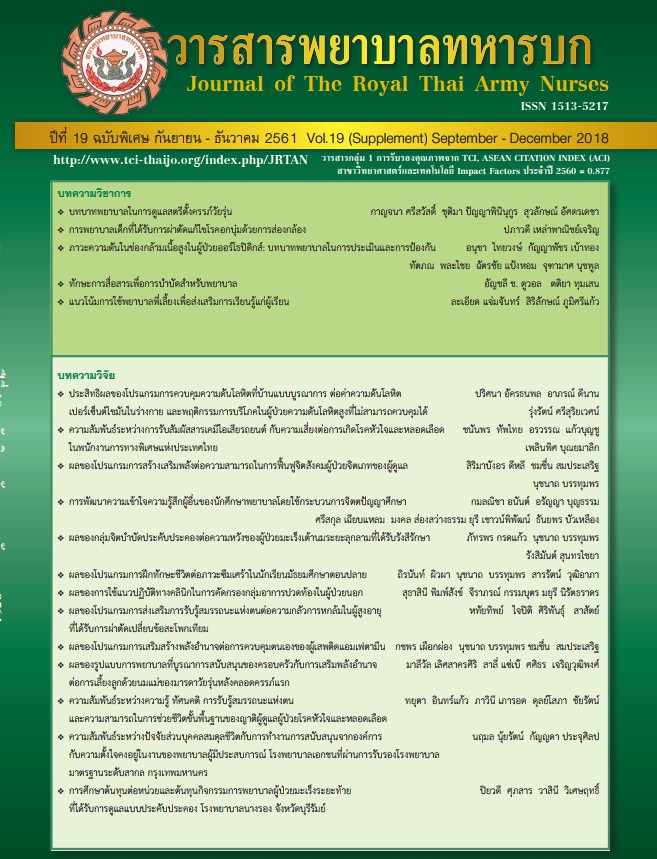Relationships between Personal Factors, Work - Life Balance, Organizational Support, and Intention to Stay of Experienced Nurses, Private Hospitals Accredited by Joint Commission International Standard, Bangkok Metropolis
Keywords:
Intention to stay, Work- Life Balance, Organizational Support, Experienced NursesAbstract
The purposes of this research were to explore the intention to stay and to examine the relationships between personal factors, work-life balance, organizational support, and intention to stay of experienced nurses, private hospitals accredited by joint commission international standard, Bangkok metropolis. The sample were 230 experienced nurses over 40 years of age and over 10 years of work experience in private hospitals accredited by joint commission international standard, Bangkok metropolis, selected by simple random sampling technique. Research instruments were personal factors, work-life balance, organizational support, and intention to stay of experienced nurse questionnaires which were confirmed content validity by experts. Cronbach’s alpha coefficient was .90 of work-life balance and .93 of organizational support questionnaires. Data were analyzed by frequency, percentage, mean, standard deviation, Eta Coefficient and Chi-square. The major findings were as follows: 1. Intention to stay of experienced nurses in private hospitals accredited by joint commission international standard, Bangkok metropolis; most of them intend to stay without turnover intention or early retirement within 1-3 years was 75.65 percent and turnover intention 24.35 percent. 2. There were significant relationships between salary level, work-life balance, organizational support and intention to stay of experienced nurses at the moderate level (Eta =.350,.681 , and .624respectively)There were significant relationships between duration of work, hometown and intention to stay of experienced nurses at the low level (Eta =.208and r = .089 respectively)
Downloads
References
2. Sawangdee K. Professional Nursing Situation in Thailand. Journal of Health Systems Research, 2010; 2 (1): 40-46. (in Thai)
3. Bursch, D.and Kelly, K. Managing the Multigenerational Workplace. UNC ExecutiveDevelopment, 2014: 1-19.
4.Dex, S., and Bond, S. Measuring work-life balance and its covariates. Work Employment Society, 2005;19: 627-636.
5. Pimthong S. Antecedent Factors Correlated with the Organizational Retention of the University Academic Staffsstudy in Thailand Srinakharinwirot University.Srinakharinwirot University, 2014.(in Thai)
6. Nualrat W. Predicting Factors of Professional nurses Retention in Private Hospitals, Bangkok Metropolis. Journal of Royal Thai Army Nurses, 2017: 112-120. (in Thai)
7. Boyle, D. K., Bott, M. J., Hason, H. E., Wood, C. Q., and Tuanton, R. L. Manager’s leadership and critical care intent to stay. American Journal
of Critical Care, 1999 (8): 361-371.
8. Eisenberger, R., Armeli, S., Rexwinkel, B., Lynch, P. D., and Rhoades, L. Reciprocation of perceived organizational support. Journal of Applied
Psychology, 2001; 86(1): 42-51.
9. Bluedorn, A.C. A unified model of turnover form organizations. Human Relations 35, 1982: 135-153.
10. Pattaravanich, U. The influence of family and employment on career planning of married female workers in a society without sex preference. Asia-Pacific Population Journal, 1995; 10(3): 63-74. (in Thai)
11. Worrachitti, N. Predicting Factors of Professional Nurses’ Retention in Private Hospitals, Bangkok Metropolis. Master Thesis of Nursing Science Program in Nursing Administration. Chulalongkorn University. 2015. (in Thai)
12. Tophanthanon, S. Factors influencing organizational retention of professional nurses, university employees, public university hospitals. Master Thesis of Nursing Science Program in Nursing Administration. Chulalongkorn University. 2006. (in Thai)
13.Wongprasert, P. Psychology. Human Resource Management, Bangkok Supplementary Media Center, 2004. (in Thai)
14. Ariyakulnimit, L. Analysis of Factors Contributing to Retention of Nursing Department, Regional Hospital and Medical Centers. Master Thesis. Nursing Administration, Faculty of Nursing, Chulalongkorn University, 2003. (in Thai)
15. Topaanthanond, P. Factors influencing talent retention: A case study of civil servant. Business Administration , 2010; 33: 35-49. (in Thai)
16. Kaewtawee, A. Relationships Between Work-life Balance, Safety Climate andOrganizational-Commitment of Professional Nurses, Private Hospitals, Southern Region. Master Thesis. Nursing Administration, Faculty of Nursing, Chulalongkorn University, 2012. (in Thai)
17. Allen, D. G., Shore, L. M. and Griffeth, R. W. The role of perceived organizational support and supportive human resource practices in the turnover process. Journal of Management 29, 2003: 99-118.
18. Palumbo, M. V. Mcintosh, B. Ramber, B. and Naud, S. Retaining and aging nurse workforce Perception of human resource practices. Nursing Economic, 2009: 221-232.
19. Scott, M. E. Strategies for retaining employees in the hospitality industry. Doctoral dissertation, Department of business administration, Doctor of business administration faculty, Walden University, 2016.
20.Sarathaphan, P. Nursing competency. Learning document. Management Thammasat University. (Reproduce),2012. (in Thai)
21.Purasuwan, S. Factors affecting the persistence of professional nurses in community hospitals. Master Thesis. Nursing Administration Faculty of Nurse Chiang Mai University,1998. (in Thai)
22. Noobut, J. Balance between life and work Case study :Vibhavadi Hospital Master. Thesis Faculty of Commerce and Accountancy Thammasat University, 2011. (in Thai)
23.Kaewpanya, L.Guidelines for promoting the balance of life and work of employees: a case study of public and private sector personnel. Master
Thesis Business Administration Bangkok University, 2012. (in Thai)
24. Sanwan, P. Factors promoting work-life balance: Case Study – Workers in public and private sector. Master Thesis Business Administration Bangkok University, 2016. (in Thai)
Downloads
Published
How to Cite
Issue
Section
License
บทความหรือข้อคิดเห็นใดใดที่ปรากฏในวารสารพยาบาลทหารบกเป็นวรรณกรรมของผู้เขียน ซึ่งบรรณาธิการหรือสมาคมพยาบาลทหารบก ไม่จำเป็นต้องเห็นด้วย
บทความที่ได้รับการตีพิมพ์เป็นลิขสิทธิ์ของวารสารพยาบาลทหารบก
The ideas and opinions expressed in the Journal of The Royal Thai Army Nurses are those of the authors and not necessarily those
of the editor or Royal Thai Army Nurses Association.






